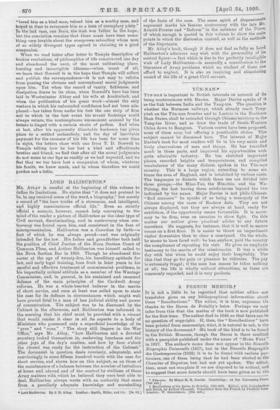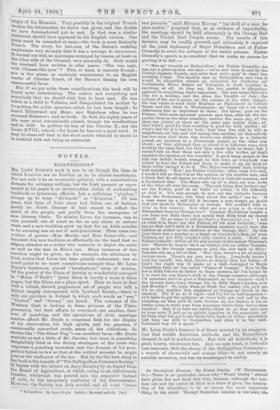A FRENCH MEMOIR.t IT is not a little to be
regretted that neither editor nor translator gives us any bibliographical information about these "Recollections." The editor, it is true, expresses his thanks to the Baron de Frenilly's heirs. Perhaps we may' infer from this that the matter of the book is now published for the first time. The author died in 1848, so that there can be no question of copyright. If, then, the " Reeollectiens " hate been printed from manuscript, what, it is natural to ask, is the history of the document P No book of the kind is to be found in the British Museum, though the Baron is there credited with a. pamphlet published under the name of "Mons. Fixx" in 1817. The author's name does not appear in the Nouvelle Biographie Universe Us (1857), but in the Nouvelle Biegraphie des Contemporairts (1822) it is to be found with various par- ticulars, one of them being that be had been elected to 60 Chamber of Deputies, but had not yet spoken. The editoi‘, then, must not complain if we are dispoeed to be critical, and to suggest that more details should have been given as to OM
• Yiln.nan. By Major IL R. Davies. Cambridge: at the University Press. pos. not.] t Recollections of the Baron de Frenilly, 1708-1828. gaited, with Introduction and Note*, by Arthur Chuquet, Translated from the French by Frederic Leos. London W. Heinemann. [10a. not.] origin of the Memoirs. Very possibly in the original French 7e1sion the information we desire was given, and the doubts We have foreshadowed put to rest. In that case a similar statement should have appeared in the English version. One thing must be conceded at onee,—the book is most distinctly French. The story, for instance, of the -Baron's wedding emphasises very strongly that it was a mariage de convenance. 'It turned out well, as marriages arranged by reason, at least on the other side of the Channel, very generally do. Only would the husband have written in after years: "She was Ugly, 'with Chinese-like eyes"? This, at least, is scarcely French ; t or is the scene, so curiously reminiscent to an English reader of Charles Lamb, of the Baron's biasing his Own unsuccessful farce.
But, if we put aside these considerations, the book will be found most entertaining. The author saw everything and everybody that we should wish him to have seen. He was taken as a child to Voltaire, and disappointed his mother by forgetting the polite speeches which be had been taught ; he heard Talleyrand say Mass ; saw Napoleon when he was crowned Emperor ; and so forth. In fact, his eighty years Of life were most conveniently placed, though his recollections end in 1828. In politics he was of the Charles X., not the Louis XVIII., school,—for Louis be tins not a good word. It may be observed that in the short notice referred to above he Is credited with not being an extremist.























































 Previous page
Previous page